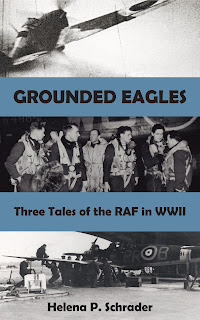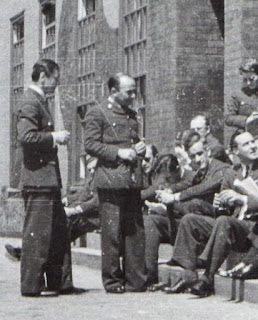The pilots and other aircrew tended to be arrogantly contemptuous of "penguins" and "wingless wonders" -- those nine-tenths of air force personnel doing various jobs that didn't entail flying. That contempt was not consistently distributed. Pilots generally had a high regard for their ground crews, who kept their aircraft serviceable, and other "technical trades," but "paper pushers generally enjoyed low regard.
And yet! No organization can, in fact, get along without them. We need people who order supplies, do the book-keeping and manage personnel files. Every RAF squadron had an adjutant -- because they needed one.
Today I introduce Ft./Lt. "Mickey" Michaels -- the Adjutant (2nd left)
Excerpt:
The squadron leader had gone off, leaving the Adjutant struggling with the paperwork that was piling up. "I can't even hold him down long enough to sign off on the the things I've prepared for him. Poor LAC Sanders has been trying to get leave to get married, and --" Mickey realized he was complaining, and at once regretted it. It never looked good for an adjutant to complain about his CO. Distressed, Mickey was unconsciously wiping his balding head with his handkerchief.
By the look of things, Allars guessed that Mickey had moved all sorts of files into his own office from the adjoining squadron leader's office. Wooden boxes were lined up not only on his desk, but on two chairs which he had placed beside it. Everything was well ordered but overflowing.
Flight Lieutenant "Mickey" Michaels didn't choose to be a penguin. He joined the RAF with every hope of learning to fly -- he simply couldn't get the hang of it and "washed out" of flying training. He could have taken a "bowler hat" and sought his fortune in the civilian world, but his love of aircraft and flying made him want to stay as close to it as he could. So he had worked his way through various jobs that did not entail flying until, with the outbreak of the war, he found himself in the most exciting and demanding job of his fifteen year career: adjutant in a fighter squadron.
Mickey has no illusions about his place in the pecking order, and his job is not made easier by being posted to one of the Auxiliary Squadrons, one of those elite squadrons composed of young men who could afford to learn to fly at their own expense. No. 606 Squadron is one of the most snobbish of them all and in the interwar years had required applicants to have an independent income of at least GBP 1,000 a year -- a sum Mickey doesn't expect to earn annually any time in his life. But the amateurs are particularly disdainful of "paper work" and tend to look on Kings Regulations as suggestions rather than requirements. Mickey doesn't stand a chance of reforming their ways, all he can do is try to patch things up behind their backs.
When the fighting and dying starts, Mickey finds himself at the front line of trying to keep the replacements in aircraft, ground crew and pilots flowing. His loyalty to the squadron is not diminished by the fact that he is unappreciated. He accepts that is his lot, and then one day things change.
Excerpt 2:
They were down to 15 operational pilots and 12 aircraft at the moment. And still no flight lieutenants. Mickey had been nagging the Group Personnel people about flight lieutenants ever since Priestman chopped Thompson, but they weren't very sympathetic. The attitude was pretty much that no squadron leader in 11 Group was going to recommend promotion for a capable flying officer at a time like this, since they would thereby risk having him posted away. If they had anyone they could trust, they were guarding him jealously.
In short, Personnel implied, 606 would just have to make do with what it had. Ringwood seemed to be working out quite well, actually. As for new pilots, Peronnel complained that they "couldn't produce pilots out of thin air" -- always with an undertone of accusation, as if the front-line squadrons were careless with the pilots they did send. But there was no way they could keep up this pace with the pilots they had. Each engagement brought the risk of fresh casualties. Mickey thought they were bloody lucky not to have lost both Priestman and Kiwi two days ago. What the hell did Priestman think he was doing, firing at a loaded bomber from less than a hundred yards? You could almost think he was suicidal -- if you didn't know the bloke.
Mickey had warmed to Priestman. Yesterday he had come to the office with a bottle of champagne and insisted they celebrate his DFC together. Mickey had been touched beyond words. Most squadron leaders would have gone to a pub or celebrated in the Mess with their pilots, not even noticing that a paper-pushing ground-hog was not among them. Instead, Priestman dragged both Mickey and Allars out of their respective dens and made them join him for a bottle of bubbly.
"This is the best book on the life of us fighter pilots in the Battle of Britain that I have ever seen.... I couldn't put it down."-- RAF Battle of Britain ace, Wing Commander Bob Doe.
Winner of a Hemingway Award for 20th Century Wartime
Fiction, a Maincrest Media Award for Military Fiction and Silver in the Global Book Awards.
Find out more at: https://crossseaspress.com/where-eagles-never-flew
they took the war to Hitler.
Their chances of survival were less than fifty percent.
Their average age was 21.
This is the story of just one bomber pilot, his crew and the woman he loved.
It is intended as a tribute to them all.
or Barnes and Noble.

For more information about all my books visit: https://www.helenapschrader.com




No comments:
Post a Comment